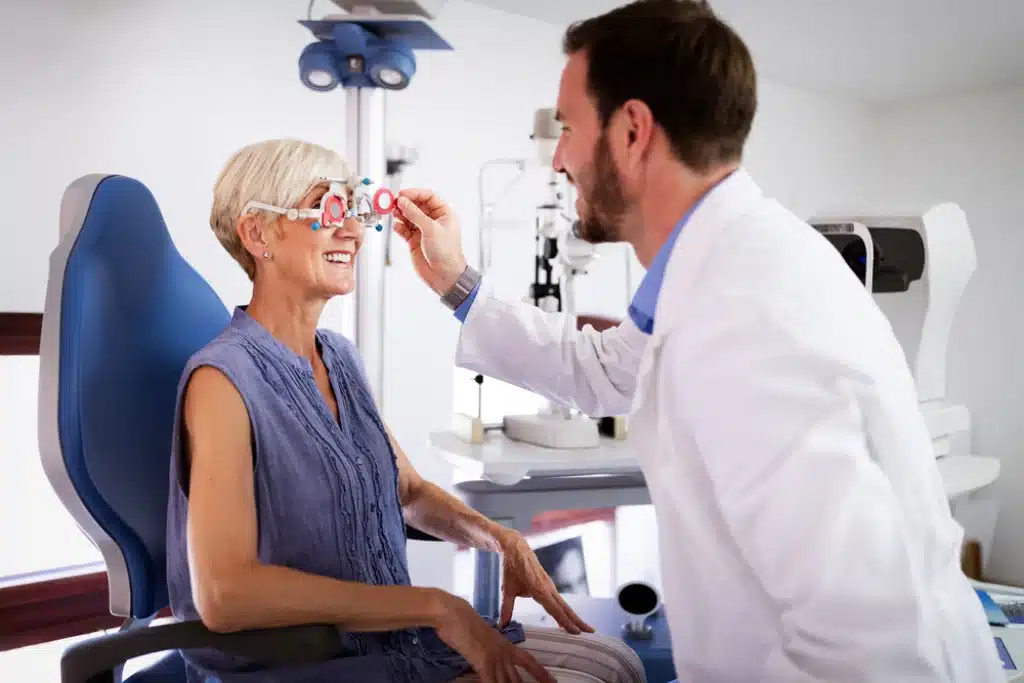Medically Reviewed by: Edward C. Wade, M.D., F.A.C.S.
What Can LASIK Surgery Correct?
As it has grown in popularity, Houston LASIK has begun to be treated as a cure-all surgery for eye issues—to the point that when patients come in, they often have to ask, “Exactly what can LASIK surgery correct?”
LASIK is an incredible procedure that has restored the vision of millions of people in North America alone. However, it cannot correct all vision issues. Let’s review the vision problems and eye health issues that the LASIK procedure can and cannot help.
What is LASIK? A quick overview.
Already familiar with LASIK? Skip to the next section: What can LASIK surgery correct?
Laser-assisted in situ keratomileusis, otherwise known as LASIK or laser eye surgery, corrects refractive errors. Refractive errors occur when a misshapen cornea misdirects the angle of light as it enters the eye, causing the light to focus on the retina at an incorrect angle and resulting in blurred vision.
LASIK reshapes the cornea using lasers, which are safer, less invasive, and more efficient than bladed LASIK procedures. The whole procedure often lasts less than 15 minutes, and LASIK recovery time is typically minimal, with many patients reporting improved vision clarity on the same day as the procedure.
In some cases (around 70%) LASIK can improve vision beyond 20/20. Over 95% of patients report satisfaction with their LASIK results.
What can LASIK surgery correct?
LASIK is a refractive surgery that works by reshaping the cornea. There are several main types of ways that your cornea can be misshapen, each resulting in its own kind of refractive error.
Nearsightedness
Nearsightedness, also known as myopia, occurs when your cornea curves at too sharp an angle, or when your eye is too elongated. Because of these aberrations, the light enters your eye and focuses too far in front of your retina, negatively affecting your distance vision. During the LASIK procedure, your ophthalmologist corrects nearsightedness by using the laser to flatten the cornea.
Farsightedness
As the name would suggest, farsightedness, also known as hyperopia, is in many ways the “opposite” of nearsightedness. Farsightedness occurs when your cornea is too flat, or when your eye is “too short.” These issues cause light to focus too far behind your retina, negatively affecting your near vision. During the LASIK procedure, your ophthalmologist corrects farsightedness by creating a steeper angle on the surface of the cornea.
Astigmatism
Astigmatism occurs when the surface of your cornea is uneven. Flat in some places, curved in others, the uneven cornea breaks up the light that enters your eye, causing it to focus on multiple places on and around your retina instead of one place. During the LASIK procedure, your ophthalmologist corrects astigmatism by smoothing the surface of the cornea.
Presbyopia
Presbyopia is an age-related eye condition that occurs when your lens loses flexibility. This loss of flexibility keeps your lens from being able to make adjustments and focus light on the retina, negatively affecting your near vision.
Scientists are still researching surgical procedures for effectively treating presbyopia. While LASIK cannot fix presbyopia completely, patients do have the option to try Monovision LASIK. During this procedure, an ophthalmologist fully corrects the distance vision of one eye while making the other slightly more nearsighted.
Some people have difficulty adjusting to monovision, so it is recommended that patients undergo a trial period using lenses or glasses that mimic the effects of monovision. Patients who can adjust to monovision enjoy the freedom from external eyewear that this procedure affords. Patients who can’t adjust to monovision might fare better with alternative treatments, including lens replacement for presbyopia.
What can’t LASIK surgery correct? Eye diseases and some extreme refractive errors.
Now that we have addressed the question, “What can LASIK surgery correct?” Let’s tackle some of the eye issues that LASIK doesn’t affect.
Keratoconus
Keratoconus is when your corneas become thin and weak, resulting in blurred vision and eyes that are cone-shaped in appearance. Because in reshaping the cornea LASIK sometimes involves thinning the cornea, patients with Keratoconus should not get LASIK surgery.
Glaucoma
There are several types of Glaucoma, all of which involve the damaging of your eyes’ optic nerves. If left untreated, glaucoma can result in extreme vision loss and even blindness. LASIK cannot address vision loss caused by glaucoma. However, if your glaucoma is being successfully treated, LASIK may still be used to correct any vision loss caused by refractive errors.
Cataracts
Cataracts are another (frequently) age-related eye condition that occurs when the proteins in the lens of your eye begin to degrade. When this breakdown occurs, the lens becomes cloudy vision problems arise. LASIK cannot address clouded lenses caused by cataracts. However, if desired, LASIK can often be performed in conjunction with or after cataract surgery.
Dry eye syndrome
During the LASIK procedure, the laser may cut some of the nerves in your cornea that detect when your eye needs extra lubrication. It is typical for patients to experience dry eyes for a short time after LASIK—as well as for most dry eye symptoms to subside after one month. However, patients who already naturally struggle with dry eyes should consult with their ophthalmologist to see whether LASIK is right for them.
Extreme refractive errors
Refractive errors are measured in units called diopters. In cases in which a patient’s refractive errors are more extreme and fall beyond certain diopter measurements, your ophthalmologist may not recommend LASIK; these patients may experience more pronounced issues with their nighttime vision and halos after LASIK. For more information, please read our article: Is My Vision Too Bad for LASIK?
Additional FAQs about what LASIK surgery can fix:
Can LASIK correct nearsightedness and farsightedness at the same time? Yes. If a patient is nearsighted in one eye and farsighted in the other, LASIK can be adjusted to correct the specific refractive area found in each eye. Not sure if you’re nearsighted or farsighted? Check out our article: The Difference Between Nearsighted and Farsighted.
Can you get LASIK if you wear bifocals?
Yes, although your doctor will likely recommend Monovision LASIK. Patients typically wear bifocals to address presbyopia, the loss of flexibility in the cornea described above.
Can you get LASIK multiple times?
While it is rare that patients would need to have LASIK performed multiple times, it can certainly be done. However, whether you are a candidate for multiple LASIK surgeries will depend on the health of your eyes and the thickness of your corneas. Patients can also opt for PRK surgery in Houston or the use of intraocular lenses (IOLs). For more information, please read our article: How Many Times Can You Have LASIK?
Curious about what LASIK surgery can correct? Considering LASIK in Houston? Contact Eye Center of Texas
Now that you know the answer to the question, “What can LASIK surgery correct?” you may be wondering, “Am I a good candidate for LASIK?” At Eye Center of Texas, we can answer these questions and more during your LASIK consultation. Our surgeons are some of the best LASIK surgeons in the country and have been pioneering advances in Houston’s eye care for decades.
LASIK can be life-changing—just check out this real-life LASIK experience by one Rice PhD student! Here at Eye Center of Texas, we are proud to be a part of these transformations and to provide Houstonians with quality, top-rated eye care.
Ready to see clearly again? Get started on your LASIK journey by calling 713-395-1515 or contacting Eye Center of Texas online today.
More Helpful Resources from Eye Center of Texas:
Financing Options Available
Apply today to find a financing option that meets your needs.
Our Locations
Houston/Bellaire
6565 W. Loop S., Suite 650Bellaire, TX 77401
Medical Office:
713-797-1010
Medical Fax:
713-357-7276
LASIK/Near Vision:
Office: 713-395-1515
Fax: 713-357-7278
Pasadena
4415 Crenshaw RoadPasadena, TX 77504
Medical Office:
281-977-8800
Medical Fax:
281-977-8877
Sugar Land
15200 S.W. Freeway, Suite 130Sugar Land, TX 77478
Medical Office:
281-277-1010
Medical Fax:
281-277-4504
Clear Lake
455 E. Medical Center Blvd., Suite 110Webster, TX 77598
Medical Office:
281-332-1397
Medical Fax:
281-282-9152
Katy
Greenhouse Medical Plaza2051 Greenhouse Road, Suite 110
Houston, TX 77084
Medical Office:
346-547-7070
Medical Fax:
281-214-2971
The Woodlands/Conroe
100 Medical Center Blvd., Suite 118Conroe, TX 77304
Medical Office:
936-647-1610
Medical Fax:
936-647-1620


